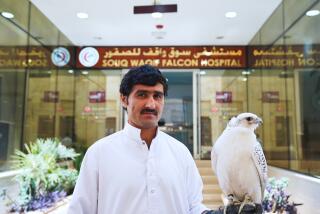Knights of Malta Called Home on Mission
- Share via
VALLETTA, Malta — Nearly two centuries after Napoleon’s forces routed them, the Knights of Malta are returning to the island they got from an emperor in exchange for a falcon and ruled for 268 years.
The “monks in armor” were called home last week for a gathering that their leadership hoped would help bolster Malta’s economy.
Officially named the Sovereign Military Order of the Hospital of St. John of Jerusalem, of Rhodes and of Malta, the knights are the oldest order of chivalry and the fourth oldest religious order in the Roman Catholic Church.
They ruled this rocky and almost barren Mediterranean archipelago from 1530, when Emperor Charles V gave it to them for the price of one trained falcon a year, until 1798 when Napoleon sent them packing without the treasures they acquired during centuries of plundering the Ottoman Empire.
Father Andrew Bertie, the 78th grand master of the 900-year-old order, summoned the knights back and urged them to help Malta improve its economy.
For centuries, membership in the knights required proof of generations of nobility. Although some ranks today are open to those without noble ancestry, the rolls are still crowded with the wealthy and influential.
The New York financier J. Peter Grace is a member, as are former U.S. Secretary of State Alexander M. Haig, Premier Giulio Andreotti and President Francesco Cossiga of Italy and Giovanni Agnelli, chairman of the Italian automobile company Fiat. Edward Bennett Williams, the Washington attorney and owner of the Baltimore Orioles major league baseball team who died in August, 1988, also was a member.
Such men are one reason the order’s Maltese association asked Bertie to call the knights back to Malta, which in 25 years of independence from Britain has found the economic road as rocky as its coastline.
Bertie, a longtime former resident of Malta, encouraged knights worldwide to attend the first world gathering of the order and openly solicited their help.
“I also urge those of you who are directly or indirectly interested in facilitating contacts with the development of the economic life of the island to do so,” Bertie told the knights earlier this year in New York.
Roger de Giorgio, president of the Maltese association of the ancient order now based in Rome, said, “We want knights from around the world to exchange ideas about our hospital work and to rediscover Malta.
“During the 268 years the knights were here, they introduced new thinking in architecture, law, medicine and merchant shipping.”
The knights made Malta a thriving center of Christianity and trade. De Giorgio said the knights also gave Malta the legal codes that are the basis for much of its modern law. In 1575 they built and then operated what then was one of the largest hospitals in Europe. They gave Malta an architectural heritage of massive fortifications and magnificent palaces and churches.
The knights today operate about 200 hospitals and first-aid centers in 90 countries, especially in the Third World and war zones.
The order was founded in the late 11th Century with the opening of a hospice for pilgrims in Jerusalem. Its centuries-old dedication to hospital work began when it treated the sick and wounded after the army of the First Crusade captured Jerusalem in 1099.
It first took up arms in the 12th Century to defend the pilgrim routes to the Holy Land.
In the late 13th Century, after the Holy Land fell to the Muslims, the knights moved first to Cyprus and then to Rhodes where they built a navy to fight the Muslim Ottoman Empire.
Sultan Suleiman the Magnificent defeated the knights and forced them to leave Rhodes on Jan. 1, 1523, although with huge losses to his troops.
Seven years later, the knights resumed the fight from Malta. Once again Suleiman attacked. This time 600 knights, 1,230 mostly Spanish soldiers and about 6,000 Maltese militia defeated an Ottoman army of 40,000. That victory in 1565 marked the beginning of the end for Ottoman sea power and earned the knights the gratitude of a threatened Europe.
More to Read
Sign up for Essential California
The most important California stories and recommendations in your inbox every morning.
You may occasionally receive promotional content from the Los Angeles Times.











